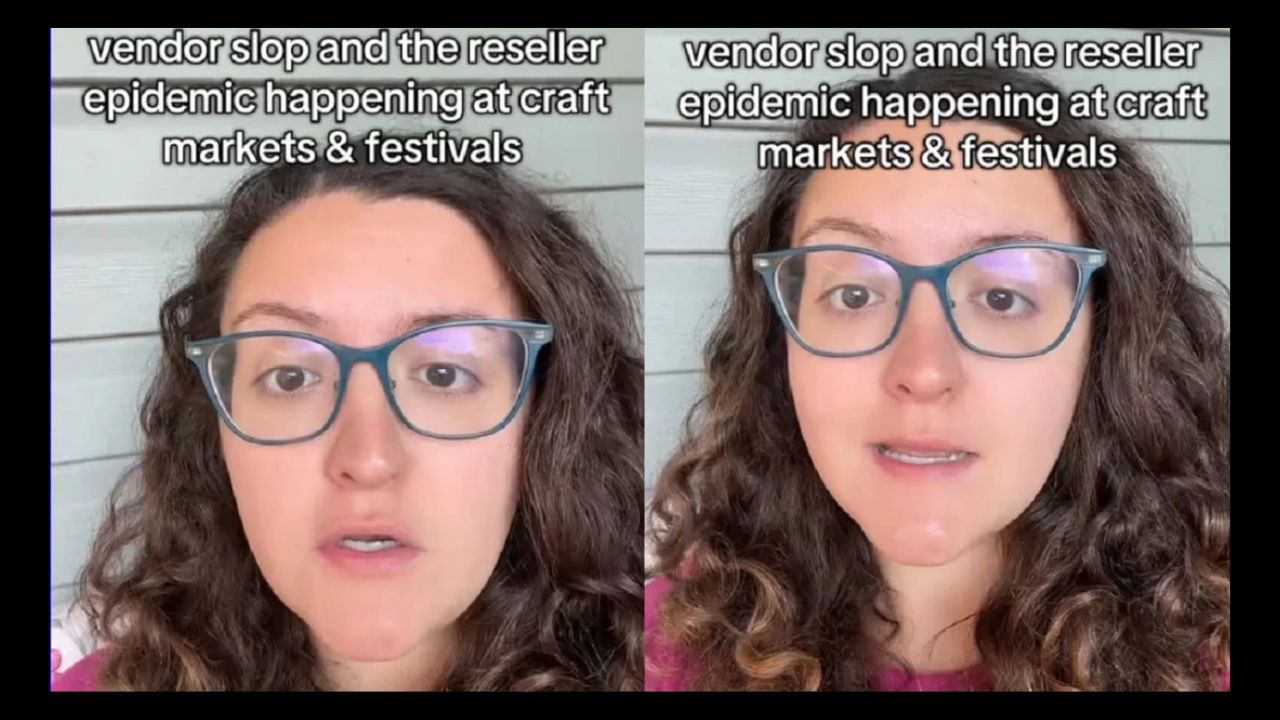Portland, OR – A frustrated Oregon woman has gone viral after calling out what she sees as a decline in creativity at local craft fairs. In a fiery TikTok rant, she accused vendors of flooding artisan markets with reseller junk and AI-generated “art,” claiming that true artists are being drowned out by cheap, mass-produced items sold at inflated prices.
TikTok User Demands Real Art
Tiktoker Binky, who frequently attends craft festivals across Oregon, expressed exasperation at the increasing number of low-effort resellers dominating booths at events once celebrated for handmade craftsmanship.
“I want to see real, unique stuff people are making! I’m tired of seeing the same useless junk everywhere I go,” she said. “People come to an artisan market with Amazon [expletive] and have the nerve to call it art.”
Binky noted that many vendors simply download cheap designs online and apply them to mugs, shirts, or keychains. She also criticized sellers using AI-generated images or unlicensed art, arguing that these practices undercut real artists.
AI-Generated and Recycled Merchandise Frustrates Fans
One of Binky’s main complaints focused on AI-based “art” and repetitive merchandise.
“Why is it every time I go somewhere, there’s a dude peddling 3D dragons? 3D-printed dragons — always the same ones, too,” she said. “The awful tumblers with the stretched-out, pixelated AI images send me.”
Social media commenters quickly agreed that the problem is not unique to Oregon. Many noted that similar trends are appearing in antique stores and other small-market venues, with drop-shipped goods and mass-produced items masquerading as original creations.
“Same thing is happening at antique stores. They’re filled with drop-shipped garbage or painted TJ Maxx furniture sold as ‘vintage,’” one user wrote.
Vendors Relying on Common Distributors
Binky pointed out that flea markets and craft fairs often feature booths with identical offerings.
“It’s like they all go through the same distributor,” she said. “You’ll see hundreds of vendors all selling the same designs, just with different names on the signs.”
This reliance on pre-made or AI-generated merchandise has, according to Binky, made it nearly impossible for genuine artisans to compete. Instead of handcrafted jewelry, paintings, or pottery, buyers encounter a sea of AI mugs, pre-printed shirts, and mass-produced figurines.
“It’s supposed to be a craft show — sell crafts, not rebranded Etsy knockoffs,” she said.
Artists Struggle Amid AI and Reseller Boom
Local creators have echoed Binky’s frustration, claiming that AI image generators and resellers have created unfair competition for those producing authentic handmade goods.
“People want cheap and fast — but they’re killing real art in the process,” one commenter said.
Portland business owners and artists report that originality is harder to find at events that have become oversaturated with similar products. “When everything looks like it came from the same feed, the joy of discovery is gone,” explained a local jewelry maker.
Read Also: Missouri Carries Out First Execution of 2025 as Lance Shockley Put to Death for 2005 Officer Murder
Community Calls for Support of Handmade Art
Binky’s TikTok has since sparked thousands of responses, with many viewers urging shoppers to prioritize purchasing from real artisans.
“If you want to support creativity, buy something that a human actually made,” one user wrote. “Not an AI image stretched onto a coffee mug.”
The conversation reflects a growing concern in the crafting community: while technology and online marketplaces have expanded access to creative tools, they have also blurred the lines between authentic handcrafts and mass-produced items. Many agree that supporting independent artists is key to preserving the integrity of local craft fairs.
Moving Forward
As the discussion continues online, Binky hopes her viral rant encourages shoppers to make more mindful purchasing decisions and support true artistry over convenience-driven, AI-generated products. By shining a spotlight on resellers and low-effort vendors, she hopes craft fairs can return to their roots: celebrating unique, handmade creations from real people.
For more updates on local events and creative culture, visit race-day-live.com.


 by
by 

